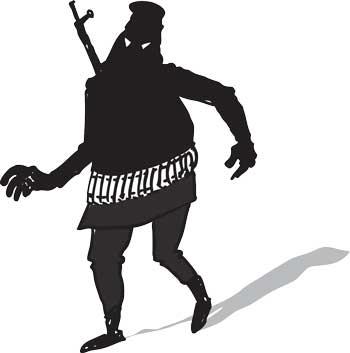Reply To:
Name - Reply Comment
Sri Lanka while being an island paradise blessed with the Buddha Dhamma and the virtues of at least three other major world religions has also been one of the worst victims of terrorism where hundreds of thousands of people were killed or injured and displaced with the economic damage being incalculable.
 In 1971, Sri Lanka experienced the youth insurrection launched by the Janatha Vimukthi Peramuna (JVP) but it was brutally crushed by the military and so were the grievances of the youth. In 1956, the SWRD Bandaranayaike Government’s “ Sinhala only policy” led to largely peaceful protests by the Tamil dominated federal party. These peaceful protests also were crushed and it led to a youth rebellion in the Northern and Eastern Provinces. In the 1970’s the Sirimavo Bandaranaike Government imposed the district quota system for university admissions and in terms of this policy Jaffna district students were barred from universities even if they got four A’s at the GCE advanced level examination while Monaragala students were admitted to universities even though they got only two A’s. This led to the creation of the Liberation Tigers of Tamil Eelam (LTTE), which became one of the world’s deadliest terrorist movements. The LTTE first killed its Tamil Party leaders including Jaffna Mayor Alfred Duraiappa, the then main Tamil political party leader Appapillai Amirthalingam and others. After the 1983 ethnic riots there was a civil war between the LTTE and the armed forces.
In 1971, Sri Lanka experienced the youth insurrection launched by the Janatha Vimukthi Peramuna (JVP) but it was brutally crushed by the military and so were the grievances of the youth. In 1956, the SWRD Bandaranayaike Government’s “ Sinhala only policy” led to largely peaceful protests by the Tamil dominated federal party. These peaceful protests also were crushed and it led to a youth rebellion in the Northern and Eastern Provinces. In the 1970’s the Sirimavo Bandaranaike Government imposed the district quota system for university admissions and in terms of this policy Jaffna district students were barred from universities even if they got four A’s at the GCE advanced level examination while Monaragala students were admitted to universities even though they got only two A’s. This led to the creation of the Liberation Tigers of Tamil Eelam (LTTE), which became one of the world’s deadliest terrorist movements. The LTTE first killed its Tamil Party leaders including Jaffna Mayor Alfred Duraiappa, the then main Tamil political party leader Appapillai Amirthalingam and others. After the 1983 ethnic riots there was a civil war between the LTTE and the armed forces.
The war ended in 2009 with the crushing of the LTTE but the consequences are still being experienced by millions of people mainly in the North and East. Unfortunately in recent years there appears to be a re-emergence of Sinhala nationalism but we hope it will not be allowed to escalate. In a policy statement on Thursday, President Gotabaya Rajapaksa assured that while giving prime place to Buddhism the Government would give full freedom and equal rights for people who practice other religions. We hope the Government will work sincerely towards the consolidation of such a multi-religious and multi-racial society. Otherwise Sri Lanka might end up in a hellhole similar to what the United States President Donald Trump has dragged his country into with his dangerously unpredictable and white supremacist policies. Thankfully most independent analysts believe the American people will defeat Mr. Trump at the presidential election on November 3.
Such reflections came to mind yesterday as we co-operated with the United Nations in marking the international day of remembrance and tribute to the victims of terrorism. In a statement, the UN says that while more countries are affected by terrorism today, the number of victims has largely been concentrated in a small number of member states. Terrorism’s victims continue to struggle to have their voices heard, their needs supported and rights upheld.
According to the UN, victims often feel forgotten and neglected once the immediate aftermath of a terrorist attack fades and this can have profound consequences for them. A few member-states have the resources or the capacity to fulfil the medium and long-term needs required for victims to fully recover, rehabilitate and integrate back into society. Victims can only recover and cope with their trauma through long-term multi-dimensional support, including physical, psychological, social and financial needs to be healed and live with dignity. The UN says it has been working to provide resources, mobilize the international community and better address the needs of terrorism’s victims.
The UN has an important role in supporting member states to implement Pillar I and IV of the UN global counter-terrorism strategy through standing in solidarity and providing support to victims, capacity building assistance, establishing networks of and offering support to, civil society organisations, particularly terrorism’s victims associations. The UN also encourages member states to promote, protect and respect the rights of victims.
In Sri Lanka, the former government set up a wide- powered Office of Missing Persons, an Office for Reparations and other measures to help terrorism victims—among both the civilians and the armed forces. But little progress seems to have been made. Both in the November 2019 presidential election and the August 5 general election this year,President Rajapaksa and the ruling Sri Lanka Podujana Peramuna (SLPP) obtained most of their votes or seats from areas outside the Northern and Eastern Provinces where minority parties emerged on top. On Thursday President Rajapaksa assured equal rights and responsibilities for all in united Sri Lanka and we hope he and the Government will sincerely work towards that vision and goal without allowing vociferous and loud-mouthed extremists to have their say or way.